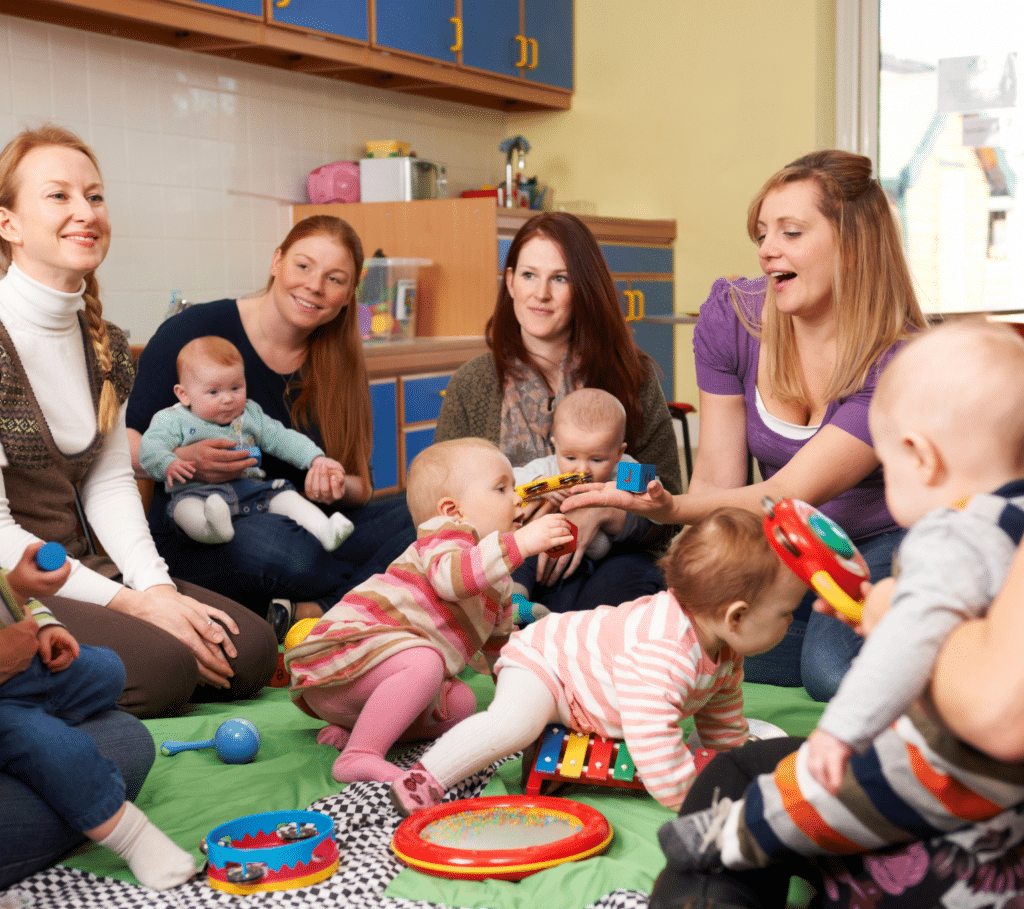Postpartum Anxiety: When Perinatal Anxiety Doesn’t Go Away After Delivery

For some women, worries come and go. Yes, you’ll be worried that you’re taking good care of your baby, as all mothers do. But these feel manageable, and with the support and reassurance of others, these ease. But for other new moms, intense worries and racing thoughts can keep bothering you long after you give birth. They can interfere with your daily life and how much you enjoy being a mom. In this case, these may not be the typical worries that come with being a new mother: They could be a sign of postpartum mental health issues.
If you or someone you love is struggling with postpartum anxiety, you’re not alone. There is support and treatment available. Keep reading below to find out:
What is perinatal anxiety?- Recognizing the signs of perinatal anxiety
- Importance of early intervention
- Treatment options for perinatal anxiety
- Coping strategies to help you manage
- How to seek support

Key Takeaways
- Postpartum anxiety is persistent, overwhelming worry that begins after childbirth (often within the first 6 weeks) and can last up to a year, especially if it’s interfering with daily life.
- It can show up physically (racing heart, nausea, shakiness, shortness of breath, sleep/appetite changes), emotionally (intrusive thoughts, irritability, excessive worry), and behaviorally (constant checking, avoidance, reassurance-seeking).
- Risk factors include a prior anxiety history, family history, sleep deprivation, hormone changes, limited support, complications, and prior loss or trauma.
- What’s the difference between normal new-parent worry and postpartum anxiety? Normal worry is short-term and fades, while postpartum anxiety persists for weeks/months and can feel overwhelming or limiting.
- Mission Connection provides postpartum anxiety support through individualized care that can include therapy (including CBT), medication management, support groups, and residential treatment when a higher level of support is needed.
Table of Contents
Understanding Perinatal Anxiety
Perinatal anxiety covers a range of anxiety disorders that you can experience during pregnancy or after giving birth. They can include generalized anxiety, panic, and social anxiety.
Perinatal anxiety can begin during pregnancy (also called prenatal anxiety), and most commonly starts between giving birth and six weeks after.2 Postpartum anxiety is the name for when it begins after giving birth, and usually up to a year afterward.
How Common Is Postpartum Anxiety?
According to the American College of Obstetricians and Gynecologists, around one in twelve women experience generalized anxiety in the first six months after giving birth. Social anxiety can be an issue for up to 7% of women soon after birth, and panic disorder occurs in up to three in every hundred new mothers within the first ten weeks after delivery.2
So, if you’re struggling with this right now, know that you’re one of many women, and there is help out there. More on this soon.
Risk Factors for Perinatal Anxiety
Having previously had an anxiety disorder or mental health condition- Family history of anxiety
- Big life changes
- Lack of support from partner or family
- Sleep deprivation
- Changes in hormones
- Difficult or complex pregnancy
- Childbirth complications
- Health challenges for mom or baby
- Prior pregnancy loss
- History of abuse or domestic violence
- An unplanned or unwanted pregnancy
- Pregnancy loss
- Preterm birth
If you are feeling completely overwhelmed right now, it’s understandable. Just remember that help is available. Perinatal anxiety can be treated very effectively once you get the right help. But to do that you need to know what signs to look out for.
Signs of Postpartum Anxiety
Anxiety can affect you physically, emotionally, and behaviorally, and the symptoms can feel anything from mild to severe. Here are some of the main symptoms of perinatal and postpartum anxiety to keep watch for:3,4
Physical Signs of Postpartum Anxiety
- Problems sleeping or not wanting to sleep
- Racing heart or palpitations
- Feeling sick or stomach aches
- Excessive sweating
- Feeling shaky
- Feeling like you can’t catch your breath
- Appetite loss
- Restlessness
- Feeling tense
Emotional and Mental Signs of Postpartum Anxiety
- Trouble relaxing
- Difficulty staying calm
- Racing thoughts or intrusive thoughts
- Worrying excessively
- Irrational fears
- Hard to focus
- Feeling irritable, on edge, or scared
Behavioral Symptoms of Postpartum Anxiety
- You avoid certain activities, people, or places
- You keep checking things
- You become controlling
- You’re overly cautious about situations that aren’t really dangerous
- You seem to constantly ask for reassurance from other people
Is It Postpartum Anxiety or Normal Worry?
Everyone gets anxious from time to time. It’s a natural response to feeling stressed or threatened. It keeps us safe from danger, and it’s short-term, not something that lasts for weeks or months.
You might feel anxious preparing for a test, and that anxiety can fuel you to study more. You may also get anxious when you start a new job because of the change and uncertainty it brings, but that will slowly fade once you get used to the new role and workplace.
Anxiety in new mothers isn’t unusual because you’ve been through a life-changing experience: You’ve given birth to a baby. But there’s a difference between the temporary ‘normal’ anxiousness, and postpartum anxiety.
Anxiety becomes a problem if it’s persistent, it feels overwhelming, or it interferes with your life on a day-to-day basis. For instance, if you stay awake all night because you’re afraid your baby will stop breathing or die in their sleep. This could be a sign of postpartum anxiety. Similarly, if you are scared to leave the house with your baby because something or someone might hurt them, then it may be time to seek outside support.
If anxiety is a problem for you, rest assured that many new mothers experience it – and it can absolutely be treated. You don’t have to continue to feel this way.
Evidence-Based Treatment for Postpartum Anxiety
So you see, treating anxiety is essential for not only you but your child’s development, too. Thankfully, there are a range of evidence-based treatment options available when looking at perinatal anxiety and treatment, with the most effective being medication and therapy. Let’s dive into each of them to find out more.
Postpartum Anxiety Therapy
In CBT, you are given time and support during therapy sessions to process your emotions and learn new ways to cope with stress and worries. Homework is usually part of the deal so you can practice your new skills outside of sessions and discuss any challenges or achievements at your next appointment.
Medication
If medication is a route you’d be interested in, it’s important to discuss it with your doctor, as some medications may be transferred through breastfeeding to your baby. You can find out more about the safety of antidepressant use in pregnancy and breastfeeding here.
Medication can take time to work, sometimes several weeks. It’s important to remember that they can level out your mood, but they don’t get to the root cause of the anxiety. That is why they are most effective when combined with therapy.8
Holistic Options for Postpartum Anxiety
Managing anxiety after pregnancy can feel like an uphill struggle. But some holistic lifestyle changes can really help, especially alongside therapy or medication. You can make these activities part of your daily routine to improve your overall well-being. Some ideas to start with are:
1. Sleep
2. Food
A healthy diet can improve your mental health and well-being.10 It can be tricky to find time to cook healthy meals as a new parent, so maybe you can lean on your support network for help, or find some nutritious take-away meals to give you a boost. But don’t feel guilty if you can’t. Sometimes, comfort food is exactly what you need at the end of a hard day.
3. Exercise
4. Mindfulness
Coping with anxiety after delivery can be a challenge. But with the right help, things will get easier, and possibly quicker than you realize.
Family and Community Support
Looking after your anxiety and mental health after delivery isn’t something you have to do alone. Your support network can help you. This may include people like:
Your Partner, Friends, or Family
Talk with your loved ones and let them know how you’re feeling and how they can help. Most people, especially your partner, are often happy to lend a hand, they just need to be told how to help. Whether it’s cooking a meal, running some errands, or looking after your bundle of joy for a couple of hours while you rest, see if they can help lighten your load.
Community Groups
Parenting can be a lonely time, especially if you’re struggling with your mental health. Fortunately, there are many support groups with new moms going through the exact same.
You could attend a local mommy and baby group to connect with other new moms. Groups can be a great source of emotional support, and you may pick up some good advice or tips from other mothers experiencing the same things as you. You could also reach out to mental health or perinatal groups to see if they offer support for mothers with postpartum anxiety.
Professional Help
You can talk with your doctor about how you are feeling and see how they can help. You could also speak to a mental health professional or make an appointment with a therapist. Mission Connection provides expert mental health services, including therapy and medication management, tailored to your needs.
Lessen Your Worries at Mission Connection
If you’re still feeling anxious weeks or months after giving birth, please know that you are not failing. Postpartum anxiety is a treatable condition that many mothers struggle with in silence. The good news is that you don’t have to do this alone.
Reaching out can feel scary, but it’s a powerful first step toward recovery. At Mission Connection, we are experts in treating mental health challenges such as postpartum anxiety. We work with you to create a completely individualized treatment plan based on your wants and needs, from therapy to medication management, support groups, residential treatment, and more.
Cost shouldn’t be a barrier to accessing the help you need, which is why we offer a variety of payment options. Click here for more details.
Whether you’re dealing with perinatal anxiety after delivery or ongoing anxiety that’s been hard to shake off, we will give you the care, compassion, and support that you deserve.
Reach out to us today by filling out our contact form, and begin your healing journey with Mission Connection.

References
- Ayers, S., Sinesi, A., Meade, R., Cheyne, H., Maxwell, M., Best, C., McNicol, S., Williams, L. R., Hutton, U., Howard, G., Shakespeare, J., Alderdice, F., & Jomeen, J. (2024). Prevalence and treatment of perinatal anxiety: diagnostic interview study. BJPsych Open, 11(1). https://doi.org/10.1192/bjo.2024.823
- The American College of Obstetricians and Gynecologists. (n.d.) Summary of Perinatal Mental Health Conditions. ACOG. Retrieved June 12, 2025, from: https://www.acog.org/programs/perinatal-mental-health/summary-of-perinatal-mental-health-conditions
- Silverwood, V. A., Bullock, L., Turner, K., Chew-Graham, C. A., & Kingstone, T. (2022). The approach to managing perinatal anxiety: A mini-review. Frontiers in Psychiatry, 13. https://doi.org/10.3389/fpsyt.2022.1022459
- Cleaveland Clinic. (2025, June 2). Postpartum Anxiety. Cleveland Clinic. https://my.clevelandclinic.org/health/diseases/22693-postpartum-anxiety
- Mental Health America. (2025, May 7). Postpartum anxiety. Mental Health America. https://mhanational.org/resources/postpartum-anxiety/
- Li, X., Laplante, D. P., Paquin, V., Lafortune, S., Elgbeili, G., & King, S. (2022). Effectiveness of cognitive behavioral therapy for perinatal maternal depression, anxiety and stress: A systematic review and meta-analysis of randomized controlled trials. Clinical Psychology Review, 92, 102129. https://doi.org/10.1016/j.cpr.2022.102129
- Zappas, M. P., Becker, K., & Walton-Moss, B. (2020). Postpartum anxiety. The Journal for Nurse Practitioners, 17(1), 60–64. https://doi.org/10.1016/j.nurpra.2020.08.017
- Collier, S. (2021, July 30). Postpartum anxiety is invisible, but common and treatable. Harvard Health. https://www.health.harvard.edu/blog/postpartum-anxiety-an-invisible-disorder-that-can-affect-new-mothers-202107302558
- Chellappa, S. L., & Aeschbach, D. (2021). Sleep and anxiety: From mechanisms to interventions. Sleep Medicine Reviews, 61, 101583. https://doi.org/10.1016/j.smrv.2021.101583
- Mental Health America. (2025, March 27). Eating for well-being. Mental Health America. https://mhanational.org/resources/eating-well-being/
- Hofmann, S. G., & Gómez, A. F. (2017). Mindfulness-Based Interventions for Anxiety and Depression. Psychiatric Clinics of North America, 40(4), 739–749. https://doi.org/10.1016/j.psc.2017.08.008
Postpartum Anxiety FAQs
It’s normal to feel more anxious after a major life change like having a baby. If worry feels constant, overwhelming, or starts affecting your sleep, ability to function, or confidence caring for your baby, that’s a sign it may be postpartum anxiety—and you deserve support.
Postpartum anxiety can affect your mind and body. You might notice racing thoughts or intrusive worries, irritability, trouble relaxing, and physical symptoms like palpitations, nausea, sweating, shakiness, restlessness, or feeling like you can’t catch your breath.
Intrusive thoughts can be frightening, but they’re a symptom—not a reflection of who you are. If they’re frequent, distressing, or causing you to check or avoid things constantly, we encourage getting help so you can feel safer and more supported.
We often recommend therapy as a first-line option—especially CBT, which helps you build practical coping skills and reduce anxiety both short- and long-term. Medication can also help, and we’ll support you in exploring options with a qualified provider, especially if you’re breastfeeding or have specific health considerations.
Small, realistic steps can help: prioritize rest when you can, eat in a way that supports your energy, add gentle movement (like walks), and use brief mindfulness or breathing exercises to calm your nervous system. We also encourage leaning on trusted people—postpartum anxiety isn’t something you have to carry alone.






